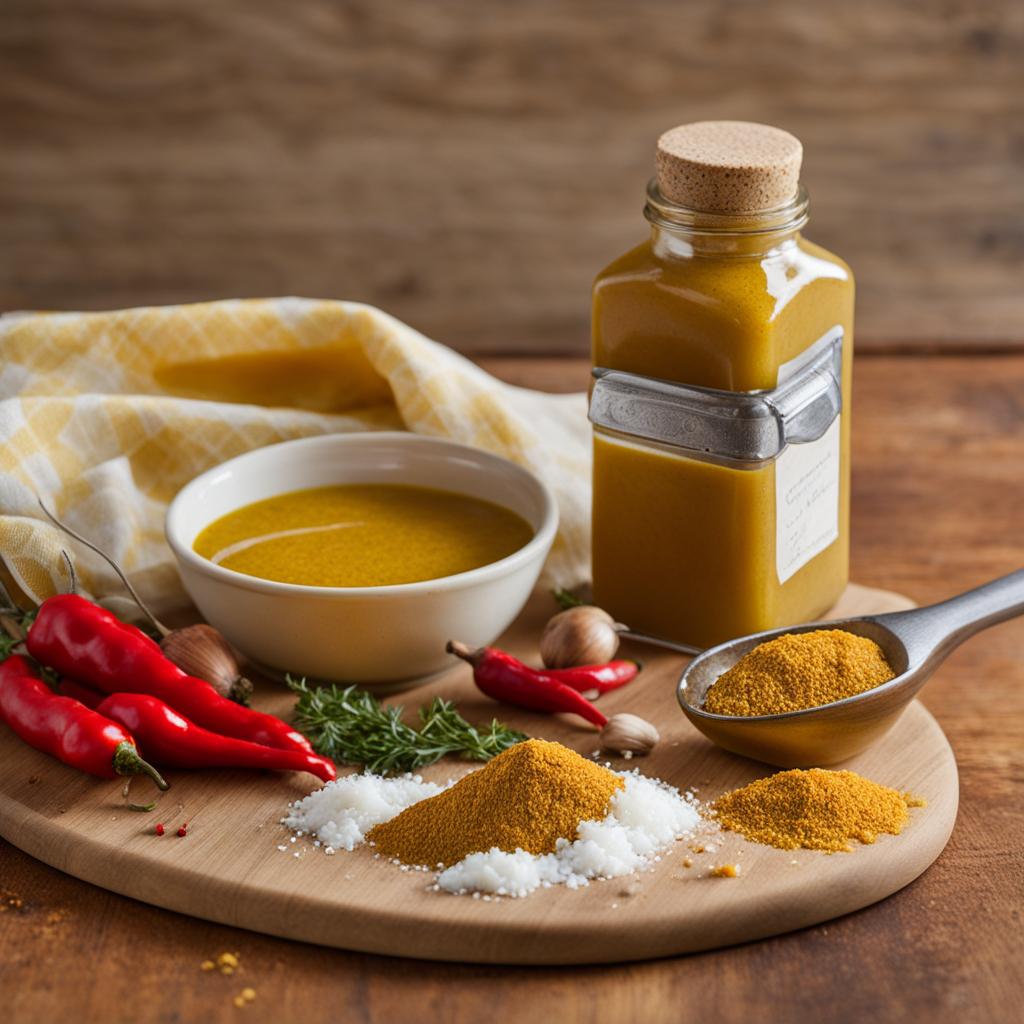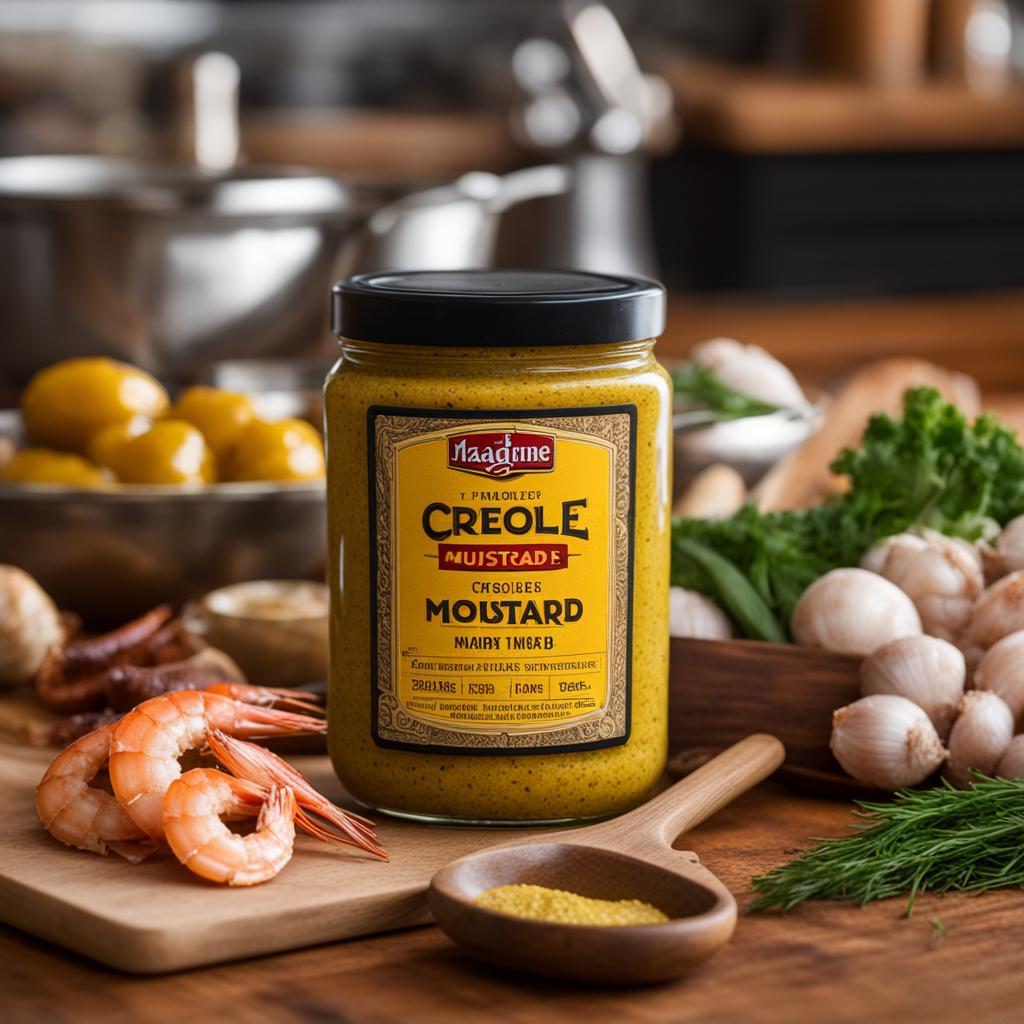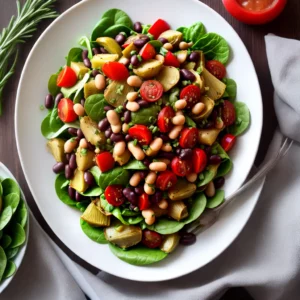Looking for a substitute for creole mustard? Whether you don’t have it on hand or simply prefer to try something different, there are plenty of alternatives that can add a similar tanginess and spiciness to your dishes. In this article, I’ll explore the best creole mustard substitutes, from store-bought options to homemade blends, so you can still enjoy the flavorful kick in your favorite recipes.
Creole mustard is a popular condiment known for its unique blend of mustard seeds, vinegar, and spices. However, if you’re in need of a substitute, there are several options that can emulate its flavor and enhance your meals. Whether you’re looking for a quick and easy alternative or prefer to get creative in the kitchen, there’s a solution for you.
Key Takeaways:
- Creole mustard substitutes are a great option when you don’t have the original condiment or want to try new flavors.
- Whole grain mustard, dijon mustard, and spicy brown mustard are some of the top alternatives to creole mustard.
- You can also make your own creole mustard substitute using yellow mustard seeds, vinegar, and spices.
- Remember to refrigerate creole mustard for optimal freshness, especially if it contains perishable ingredients.
- Don’t let the absence of creole mustard stop you from enjoying the vibrant flavors of Louisiana cuisine!
What is Creole Mustard?
Creole mustard is a flavorful condiment that originated in Louisiana, USA. It is known for its spicy and tangy taste, which adds a unique kick to dishes. Made from a blend of mustard seeds, vinegar, and various spices, creole mustard has a distinct flavor profile that sets it apart from other mustards.
In Louisiana-style cuisine, creole mustard is a staple ingredient used in a variety of dishes, including sandwiches, dressings, marinades, and sauces. Its bold flavor and zesty notes make it a popular choice among those who enjoy a little heat in their meals.
Whether you’re a fan of Louisiana cuisine or simply enjoy exploring different condiments, creole mustard is a condiment worth trying. Its robust flavor and versatility make it a great addition to any pantry.
Why Substitute Creole Mustard
There are several reasons why you might want to substitute creole mustard. Whether it’s due to personal preference or availability, having alternative options on hand can be helpful in enhancing your dishes. Let’s explore the reasons why you might consider using a substitute for creole mustard:
1. Spiciness:
Creole mustard is known for its spiciness, which can be overpowering for some taste buds. If you prefer a milder flavor profile, substituting creole mustard with a less spicy alternative can ensure that your dish is more enjoyable to eat.
2. Availability:
Not all grocery stores carry creole mustard, especially if you live in an area where it is not commonly used. If you are unable to find creole mustard in your local store, having a substitute on hand allows you to still enjoy the unique tanginess and flavor that creole mustard adds to dishes.
3. Flavor Experimentation:
Using a creole mustard substitute provides an opportunity for flavor experimentation in your recipes. By trying out different types of mustards, you can create unique flavor combinations and discover new tastes that enhance your dishes in unexpected ways.
| Creole Mustard Substitute | Flavor Profile | Usage |
|---|---|---|
| Spicy Brown Mustard | Strong, spicy, and tangy | Great for sandwiches, marinades, and dressings |
| Whole Grain Mustard | Coarse texture with a pungent flavor | Ideal for salad dressings, marinades, and sauces |
| Dijon Mustard | Tangy flavor with a hint of spiciness | Perfect for sandwiches, marinades, and dressings |
“Using a creole mustard substitute provides an opportunity for flavor experimentation in your recipes.”
With these alternatives, you can find the perfect substitute for creole mustard that suits your taste preferences and enhances your culinary creations. Whether you’re looking for a milder option, an easily accessible substitute, or want to explore different flavors, the best creole mustard substitute is just a jar away.
Whole Grain Mustard
Whole grain mustard is a versatile and flavorful condiment that can serve as an excellent substitute for creole mustard. Made with whole mustard seeds, vinegar, and spices, it offers a unique flavor profile that adds a tangy and spicy kick to dishes. Its coarse texture provides a delightful crunch, enhancing the overall sensory experience.
Usage: Whole grain mustard can be used in a variety of ways to elevate your culinary creations. It pairs well with sandwiches, charcuterie boards, grilled meats, and cheese plates. Additionally, it can be incorporated into marinades, salad dressings, and sauces to infuse your dishes with a distinctively bold and zesty flavor.
| Whole Grain Mustard | Flavor Profile | Usage |
|---|---|---|
| Appearance | Coarse texture with visible mustard seeds | – |
| Flavor | Tangy and spicy | – |
| Pairing Suggestions | Sandwiches, grilled meats, cheese plates | – |
| Usage Ideas | Marinades, salad dressings, sauces | – |
Whole grain mustard is readily available in most supermarkets, making it a convenient and accessible alternative to creole mustard. Its robust flavor profile and versatility make it a popular choice among chefs and home cooks alike. So, if you find yourself without creole mustard, don’t hesitate to reach for whole grain mustard to add a delightful tang and spice to your dishes.
Dijon Mustard
Dijon mustard is a versatile condiment that can be used as a substitute for creole mustard. It originated in Dijon, France, and is known for its tangy and slightly spicy flavor. Dijon mustard is made with brown or black mustard seeds and white wine, giving it a unique taste that can enhance a variety of dishes.
One of the key differences between Dijon mustard and creole mustard is the texture and color. Dijon mustard has a smoother consistency and a pale yellow color, while creole mustard has a coarser texture and a darker shade. Despite these differences, Dijon mustard can still add a tangy kick to sandwiches, marinades, and dressings.
When using Dijon mustard as a substitute for creole mustard, keep in mind that the flavor profile may be slightly different. Dijon mustard has a distinct taste that can bring a subtle spiciness to your dishes. Experiment with different amounts to achieve the desired level of tanginess and heat. Overall, Dijon mustard is a great alternative when you don’t have creole mustard on hand.
| Creole Mustard | Dijon Mustard |
|---|---|
| Originates from Louisiana, USA | Originates from Dijon, France |
| Spicy and tangy flavor | Tangy and slightly spicy flavor |
| Coarse texture | Smooth texture |
| Dark shade | Pale yellow color |
Usage Tips for Dijon Mustard
- Spread Dijon mustard on sandwiches for an added tangy kick.
- Whisk Dijon mustard into salad dressings for a flavorful twist.
- Use Dijon mustard as a marinade for meats and poultry to enhance the taste.
- Stir Dijon mustard into sauces and gravies for a tangy and creamy finish.
“Dijon mustard adds a unique tanginess and spice to dishes, making it a great substitute for creole mustard.”
Spicy Brown Mustard: A Tangy Substitute
If you’re looking for a tangy and flavorful alternative to creole mustard, spicy brown mustard is an excellent choice. Made from brown mustard seeds, vinegar, water, and a blend of spices, spicy brown mustard offers a bold and zesty flavor that can elevate any dish. Its unique combination of tanginess and spiciness makes it a perfect substitute for creole mustard in a variety of recipes.
Spicy brown mustard has a distinct flavor profile that adds a kick to sandwiches, marinades, and salad dressings. It pairs well with meats, cheeses, and vegetables, providing a robust and zesty taste. Whether you’re grilling burgers, making a tangy vinaigrette, or spreading it on a sandwich, spicy brown mustard can bring an extra layer of flavor to your culinary creations.
When using spicy brown mustard as a substitute for creole mustard, keep in mind that it may not have the exact same flavor. However, its tangy and spicy qualities can still enhance your dishes and provide a similar taste experience. So, the next time you’re out of creole mustard or want to experiment with a different flavor, reach for spicy brown mustard and enjoy its delicious zing.
Table: A Comparison of Spicy Brown Mustard and Creole Mustard
| Aspect | Spicy Brown Mustard | Creole Mustard |
|---|---|---|
| Flavor Profile | Robust, tangy, and spicy | Spicy and tangy with a unique blend of spices |
| Usage | Perfect for sandwiches, marinades, dressings | Ideal for Louisiana-style cuisine and flavor experimentation |
| Texture | Smooth and creamy | Smooth and grainy |
| Availability | Widely available in grocery stores | May be less readily available |
As shown in the table above, while there are differences between spicy brown mustard and creole mustard, spicy brown mustard can still serve as a flavorful substitute. Its tangy and spicy profile, along with its versatility in various recipes, make it an excellent choice when you’re in need of a creole mustard alternative.
Homemade Creole Mustard Substitute
If you prefer to make your own creole mustard substitute, you can follow a simple recipe using common ingredients like yellow mustard seeds, vinegar, and spices. Making your own homemade substitute allows you to customize the flavor to your liking and create a tangy and spicy condiment that can be used in various dishes.
To make the homemade creole mustard substitute, start by combining ½ cup of yellow mustard seeds, ½ cup of vinegar (such as apple cider vinegar), and ¼ cup of water in a bowl. Let the mixture sit for about 10 minutes to allow the mustard seeds to soften.
Next, add your desired spices to the mixture. Traditional creole mustard spices include paprika, cayenne pepper, garlic powder, onion powder, and a touch of sweetness with a pinch of brown sugar or honey. Adjust the amounts of the spices to suit your taste preferences. Stir the mixture well to combine all the ingredients.
Once the ingredients are well mixed, transfer the mixture to a blender or food processor. Blend until you reach your desired consistency, whether you prefer a smooth or coarse texture. If the mixture is too thick, you can add a little more water or vinegar to thin it out.
Your homemade creole mustard substitute is now ready to use in your favorite dishes like sandwiches, marinades, or dressings. Store the homemade substitute in an airtight container in the refrigerator for up to two weeks to maintain its freshness.

Homemade Creole Mustard Substitute Recipe:
| Ingredients | Amount |
|---|---|
| Yellow Mustard Seeds | 1/2 cup |
| Vinegar | 1/2 cup |
| Water | 1/4 cup |
| Paprika | 1 teaspoon |
| Cayenne Pepper | 1/2 teaspoon |
| Garlic Powder | 1/2 teaspoon |
| Onion Powder | 1/2 teaspoon |
| Brown Sugar or Honey | Pinch |
Combine the yellow mustard seeds, vinegar, and water in a bowl. Let sit for 10 minutes. Add the spices and stir well. Transfer to a blender or food processor and blend until desired consistency. Store in the refrigerator for up to two weeks.
Homemade Creole Mustard Using Prepared Mustard
If you’re looking for a quick and easy way to make homemade creole mustard, using prepared mustard as a base is a great option. By mixing together prepared spicy brown mustard with a few additional ingredients, you can create a flavorful and spicy homemade creole mustard blend. Here’s a simple recipe to get you started:
Ingredients:
- 1/2 cup prepared spicy brown mustard
- 1 tablespoon horseradish
- 1 teaspoon paprika
- 1/2 teaspoon garlic powder
- Pinch of cayenne pepper (optional, for added heat)
Instructions:
- In a small bowl, combine the prepared spicy brown mustard, horseradish, paprika, garlic powder, and cayenne pepper (if using).
- Stir well to ensure all the ingredients are fully incorporated.
- Taste and adjust the seasoning according to your preference, adding more horseradish, paprika, or garlic powder if desired.
- Transfer the homemade creole mustard to a jar or airtight container and refrigerate for at least 30 minutes to allow the flavors to meld together.
- Your homemade creole mustard is now ready to be enjoyed! Use it as a dip, spread, or condiment to add a tangy and spicy kick to your favorite dishes.
This homemade creole mustard using prepared mustard is a versatile and delicious alternative that can be easily customized to suit your taste preferences. Feel free to adjust the spice levels or experiment with other ingredients to create your own unique blend. Enjoy the bold flavors of creole mustard in the comfort of your own kitchen!
| Ingredients | Measurement |
|---|---|
| Prepared spicy brown mustard | 1/2 cup |
| Horseradish | 1 tablespoon |
| Paprika | 1 teaspoon |
| Garlic powder | 1/2 teaspoon |
| Cayenne pepper (optional) | Pinch |
“Making your own creole mustard using prepared mustard is a simple and delicious way to add a spicy kick to your dishes. Customize the recipe to your liking and enjoy the flavors of creole cuisine at home!”
Creole Mustard and Stone Ground Mustard Comparison
When it comes to mustard varieties, creole mustard and stone ground mustard are often compared due to their similar coarse texture and strong flavors. However, there are distinct differences that set these two mustards apart.
Creole mustard is known for its spicy and tangy taste, which adds a bold kick to dishes. It is made from a blend of mustard seeds, vinegar, and spices, giving it a unique flavor profile. On the other hand, stone ground mustard is made from whole mustard seeds and typically has a slightly milder and less tangy flavor compared to creole mustard.
The texture of these mustards also differs. Creole mustard has a smoother consistency, while stone ground mustard retains the whole mustard seeds, resulting in a grainier texture. This difference in texture can impact the overall mouthfeel and visual appeal of dishes.
| Creole Mustard | Stone Ground Mustard |
|---|---|
| Spicy and tangy flavor | Milder flavor |
| Smooth consistency | Grainy texture |
| Commonly used in Louisiana-style cuisine | Used in a variety of dishes globally |
While both creole mustard and stone ground mustard are versatile condiments, they each bring a distinct flavor and texture to different culinary creations. Whether you’re looking for a spicy kick or a milder grainy texture, these mustards can enhance the taste of your dishes in unique ways.
Creole Mustard Brands
If you’re in the market for creole mustard, there are several brands that offer this tangy and spicy condiment. One popular brand is Zatarain’s, known for its authentic Louisiana flavors. Zatarain’s creole mustard is made with a blend of mustard seeds, vinegar, and spices, giving it that signature kick.
Another well-known brand is Tony Chachere’s, which has been providing flavorful creole seasonings and condiments for over 40 years. Tony Chachere’s creole mustard is made with bold spices and delivers a tangy taste that pairs well with a variety of dishes.
For those who enjoy a little extra heat, Tabasco offers a creole mustard that combines the flavors of their iconic hot sauce with the tanginess of mustard. Tabasco creole mustard is made with Tabasco peppers, vinegar, and spices, creating a unique and fiery twist on the classic condiment.
| Brand | Description |
|---|---|
| Zatarain’s | Authentic Louisiana flavors with a signature kick. |
| Tony Chachere’s | Over 40 years of providing flavorful creole seasonings and condiments. |
| Tabasco | A unique and fiery twist on creole mustard with the flavors of Tabasco hot sauce. |
Each brand offers its own take on creole mustard, so you can choose the one that best suits your taste preferences. Whether you’re looking for traditional Louisiana flavors or a spicier twist, these creole mustard brands have you covered.
Is Creole Mustard Spicy?
Yes, creole mustard is known for its spicy flavor. It has a bold and tangy taste that adds a kick to dishes. The level of spiciness can vary depending on the brand and individual preferences. It’s important to note that some people may find the spiciness too intense, while others enjoy the heat it brings to their dishes.
When it comes to incorporating creole mustard into your recipes, it’s crucial to consider the desired level of spiciness. If you enjoy a milder flavor, you can opt for a creole mustard brand that offers a less intense spiciness. On the other hand, if you prefer a fiery kick, you can choose a brand that boasts a higher level of heat.
I love using creole mustard in my dishes because it adds a zesty and spicy flavor that takes them to the next level. Whether I’m making a spicy creole mustard marinade for grilled chicken or adding a dollop to my sandwiches for an extra kick, creole mustard never fails to deliver that perfect balance of tanginess and heat.
It’s worth noting that the spiciness of creole mustard can be adjusted by controlling the amount you use in your recipes. If you prefer a milder flavor, you can use a smaller amount, while those who enjoy a fiery taste can add a generous portion to achieve the desired level of heat. Remember, a little creole mustard can go a long way in enhancing the flavor profile of your dishes.

The Spicy Flavor of Creole Mustard: A Taste Sensation
Creole mustard is synonymous with bold, fiery flavor. Its spicy profile brings a vibrant kick to dishes, making it a go-to condiment for those who enjoy a bit of heat. Whether you’re exploring Louisiana cuisine or simply adding a tangy twist to your favorite recipes, creole mustard is sure to deliver that irresistible spicy goodness.
Does Creole Mustard Need to be Refrigerated?
When it comes to storing creole mustard, refrigeration is not always necessary, but it can help maintain optimal freshness. While unopened creole mustard can be stored in a cool, dry place, it is recommended to refrigerate it once opened. This can extend its shelf life and preserve its quality for a longer period of time.
Creole mustard typically has a shelf life of 12 to 18 months when stored in the refrigerator. However, it’s important to check the label for specific storage instructions, as some brands may have different recommendations. If creole mustard contains perishable ingredients like eggs, refrigeration is necessary to prevent bacterial growth and maintain food safety.
By refrigerating creole mustard, you can ensure that it stays fresh and flavorful for an extended period. This is particularly important if you don’t use it frequently or if you live in a hot and humid climate. Refrigeration helps slow down the breakdown of the ingredients and preserves the tangy and spicy flavor that makes creole mustard so delicious.
Table: Shelf Life of Creole Mustard
| Storage | Shelf Life |
|---|---|
| Unopened (cool, dry place) | Up to 18 months |
| Opened (refrigerated) | 12 to 18 months |
“Refrigeration helps slow down the breakdown of the ingredients and preserves the tangy and spicy flavor that makes creole mustard so delicious.”
Whether you choose to refrigerate your creole mustard or not, it’s important to check the freshness and quality before using it. If you notice any signs of spoilage, such as a foul odor or mold growth, it is best to discard the mustard to ensure safety. By following proper storage guidelines, you can enjoy the vibrant flavors of creole mustard in your favorite dishes for an extended period of time.
Best Creole Mustard Substitutes
In case you don’t have creole mustard on hand or want to try something different, there are several alternatives that can serve as excellent creole mustard substitutes. Whether you prefer the convenience of store-bought options or enjoy making your own homemade blends, these alternatives can add a similar tanginess and spiciness to your dishes.
Spicy Brown Mustard
Spicy brown mustard is a flavorful substitute for creole mustard. Made from brown mustard seeds, vinegar, water, and various spices, it offers a strong and tangy flavor. While it may not have the exact same taste as creole mustard, it can still add a spicy kick to your sandwiches, marinades, and salad dressings.
Whole Grain Mustard
An excellent substitute for creole mustard is whole grain mustard. This type of mustard is made with whole mustard seeds, vinegar, and spices, giving it a coarse texture and a strong, pungent flavor. Whole grain mustard can provide the tanginess and spiciness you desire in your dishes and works well in salad dressings, marinades, and sauces.
Homemade Blend
If you enjoy experimenting in the kitchen, you can create your own homemade creole mustard substitute. A simple recipe involves using yellow mustard seeds, vinegar, spices, and a touch of sweetness. By adjusting the proportions and spices, you can customize the flavor to your liking. This homemade blend can be used in various dishes, from sandwiches to marinades and dressings.
With these creole mustard substitutes – spicy brown mustard, whole grain mustard, and homemade blends – you can still achieve the tangy and spicy flavors that creole mustard brings to your favorite dishes. Whether you choose to explore store-bought options or get creative in your own kitchen, these alternatives are sure to deliver the vibrant tastes you desire.
| Creole Mustard Substitute | Flavor Profile | Usage |
|---|---|---|
| Spicy Brown Mustard | Strong, tangy, and spicy flavor | Sandwiches, marinades, salad dressings |
| Whole Grain Mustard | Coarse texture, pungent flavor | Salad dressings, marinades, sauces |
| Homemade Blend | Customizable, tangy and spicy with a touch of sweetness | Sandwiches, marinades, dressings |
Conclusion
In conclusion, if you find yourself in need of a creole mustard substitute, there are plenty of alternatives to choose from. Spicy brown mustard, whole grain mustard, and homemade blends are all excellent options that can add a similar tanginess and spiciness to your dishes. Whether you prefer the convenience of store-bought alternatives or enjoy experimenting with homemade versions, these substitutes will not disappoint.
Don’t let the absence of creole mustard stop you from enjoying the vibrant flavors of Louisiana cuisine. With the range of alternatives available, you can still achieve that unique combination of tangy and spicy flavors that creole mustard brings to your favorite dishes. So go ahead and explore these creole mustard substitutes and elevate your culinary creations!
Remember, whether you’re making a sandwich, marinade, or dressing, these alternatives can fill the void left by creole mustard and provide a delightful flavor experience. So get creative in the kitchen and embrace the wide array of creole mustard substitutes at your disposal. Your taste buds will thank you!
FAQ
What is creole mustard?
Creole mustard is a popular condiment with a unique blend of mustard seeds, vinegar, and spices. It originated from Louisiana, USA, and is known for its spicy and tangy taste.
Why would I need to substitute creole mustard?
There are several reasons why you might want to substitute creole mustard, such as finding the spiciness overwhelming, not having access to it, or wanting to experiment with different flavors.
What can I use as a substitute for creole mustard?
Some popular alternatives to creole mustard include whole grain mustard, Dijon mustard, spicy brown mustard, homemade creole mustard substitutes, and stone ground mustard.
How can I make a homemade creole mustard substitute?
You can make a homemade creole mustard substitute using yellow mustard seeds, vinegar, spices, and a touch of sweetness. There are also recipes that use prepared mustard as a base, mixed with horseradish, paprika, garlic powder, and other spices.
Can I use stone-ground mustard as a substitute for creole mustard?
While stone-ground mustard has a similar texture and strong flavor, it may have a slightly different flavor profile compared to creole mustard. However, it can still be a suitable alternative for adding a coarse texture to dishes.
What are some popular creole mustard brands?
Some popular creole mustard brands include Zatarain’s, Tony Chachere’s, and Tabasco. Each brand may have its own unique flavor profile, so it’s worth trying different brands to find the one that suits your taste preferences.
Is creole mustard spicy?
Yes, creole mustard is known for its spicy flavor. It adds a bold and tangy kick to dishes. The level of spiciness can vary depending on the brand and individual preferences.
Does creole mustard need to be refrigerated?
While creole mustard does not necessarily need to be refrigerated, it can be stored in the refrigerator for optimal freshness. Once opened, it can last for 12 to 18 months in the fridge. Always check the label for specific storage instructions.
What are the best creole mustard substitutes?
The best creole mustard substitutes include spicy brown mustard, whole grain mustard, and homemade blends using ingredients like horseradish and spices. These alternatives can add a similar tanginess and spiciness to dishes and can be used in various recipes like sandwiches, marinades, and dressings.
Source Links
- https://ginabnutrition.com/veganism/creole-mustard-substitute-top-3-alternatives-for-your-recipes/
- https://www.foodchamps.org/substitute-for-creole-mustard/
- https://recipesubstitutions.com/creole-mustard-substitute/
Related Recipes:
 How to Make Homemade Croutons? (Perfect Every Time!)
How to Make Homemade Croutons? (Perfect Every Time!)
 How to Make Greek Yogurt (No Special Equipment)
How to Make Greek Yogurt (No Special Equipment)
 How to Cut a Pomegranate? (Step-By-Step Guide)
How to Cut a Pomegranate? (Step-By-Step Guide)
 Cheesy Creole Breakfast Skillet
Cheesy Creole Breakfast Skillet
 Top Side Dishes to Serve with Salmon
Top Side Dishes to Serve with Salmon
 Honey Mustard Dressing
Honey Mustard Dressing
 Broccolini Substitute: Best Alternatives and Ideas
Broccolini Substitute: Best Alternatives and Ideas
 Savory Whole Chicken Crock Pot Recipe You’ll Love!
Savory Whole Chicken Crock Pot Recipe You’ll Love!








